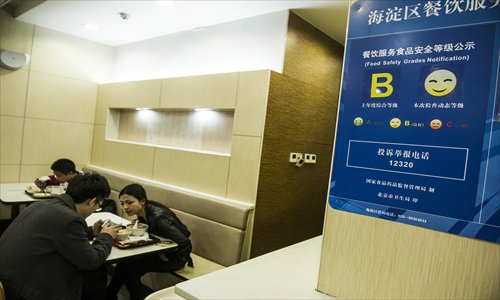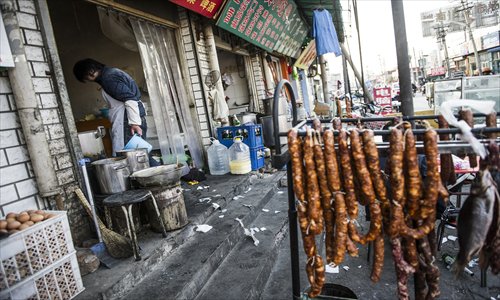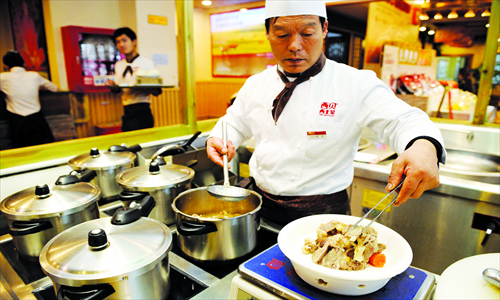Opening the lid on food safety



A flock of grown men dressed in nice suits scrambled in the wake of a small mouse in a food court - a sight Zhao Wei never expected to see in Beijing.
On February 22, Zhao, a website editor, was having lunch at the food court on the basement floor of her office building when the chase broke out. Women screamed and men dashed "like they were in a relay race" after a "frightened, perplexed and disoriented" little mouse.
Zhao, 23, couldn't swallow her lunch anymore.
Nina Ma, 23, had a similar experience on March 12 at the Zhongguancun branch of Banana Leaf in Haidian district. She finished her meal and looked down to see a gray mouse running by, right in front of her.
"It was so frightening that I almost wet myself," Ma wrote later on her Weibo page.
"In retrospect, I think it was not a big deal," said Zhao, who will continue to eat at the same food court. "Who can really guarantee everything they eat is clean and healthy?"
The good news for foodies who enjoy fearlessly sampling all kinds of restaurants in Beijing is that there is a hygiene rating system of the restaurants in Beijing in place. Familiarize yourself with it and save yourself from dining disasters or mice chases.
Get to know the ratings
You might have already noticed the signs hanging in many restaurants that read A, B or C. An A rating denotes "good" health and sanitary conditions, B stands for "standard" and C means "basic."
The ratings are also published on bjhi.gov.cn, the official website of the Beijing Health Inspection Institute (BHII), which is responsible for the rating work. Citizens can use the website to learn the hygiene ratings of any restaurant, clinic, swimming pool or other public place by searching for it by name or address.
Inspections are conducted in accordance to the evaluation standards made in 2011 by the government, with criteria concerning the hygiene management, construction, cooking materials, environment and operations.
If the restaurants break the rules, there will be a corresponding score deduction off the total. For example, if a cook doesn't wash and sanitize their hands before working with food, they'll lose five points. One of the rating rules says that effective pest and mice control equipment, such as traps, should be properly placed, or there will be corresponding downgradings.
If the restaurant gets 85 percent or more of the total 300 points, it's rated as an A. Scores of 75 percent win a B, and 60 percent a C. Those restaurants that don't land scores of at least 60 percent will be ordered to fix their discrepancies in cleanliness before a deadline, or their licenses would be suspended. A-level restaurants will get inspected once a year, but others receive more frequent checks. There are currently about 2,000 inspectors covering Beijing's 60,000 restaurants, said Ma Yanming, publicity officer at the Beijing Health Bureau.
The results are updated on the website everyday, said Xu Yadong, director of BHII. All the restaurants in Beijing are evaluated, including night stands and even the farm stays in the suburbs.
While the bjhi.gov.cn listings are comprehensive and provide written descriptions of sanitary conditions, not all entries for restaurants show their letter grades.
Xu said that "not rated" means the restaurant has only been open for less than three months.
As for older restaurants still without posted grades, Xu said the rating process started with big restaurants, and smaller restaurants of less than 150 square meters may still be on the waiting list. But ratings for all restaurants in Beijing, big or small, will be available online by June.
The website also does not show which restaurants received D grades. Ma said this was because these restaurants are under review and are working to change their grade.
As for the signs within restaurants advertising sanitation grades, Xu said, "If the restaurants don't put up the sign, they'll face administrative punishments."
"Accidents such as food poisoning have complicated causes, including temperature, humidity, bacterial infection and others, so we make the whole thing simpler by recommending citizens go to the A- and B-rated restaurants," said Xu.
The rating system has been a good reference for Beijingers since it launched in 2006. This year, all the old signs will be replaced by the new, nationally unified design by the end of June. In the new design, A-level restaurants receive a laughing face, B's a smiley face and C's an apathetic, flat-lined face.
How clean is your favorite spot?
Strict inspections show Beijing restaurants, often those considered top among expats, to continually fall short of inspection standards and requirements.
The Italian chain Annie's has been recorded in the past as having made key improvements to its hygiene and safety standards after being dealt a C grade last year by bureau inspectors following a discovery of vermin in Annie's kitchens. The restaurant currently holds a B at most branches.
Yet, this year's inspection, carried out on February 16, reported Annie's Ritan Park branch on Shenlu Jie, Chaoyang district, to have both inadequate cleaning standards as well as no "morning check system" for food safety in its kitchens. Guomao and The Place branches are currently listed by BHII as a C.
Annie's operation department manager in Beijing, James Xia, told Metropolitan he was not aware that rats and bugs had been found in his restaurants. He says he does not believe restaurants ought to be allowed to continue business in such conditions.
"Why would the government allow us to operate if we really had a pest problem, honestly? We hire cleaning companies, which I can assure you are well-qualified, that clean our kitchens on a regular basis. We definitely had not and do not have this problem," he says.
"Food hygiene is an important standard to meet, but the scale of our restaurant is another factor that inhibits our excellence in the eyes of inspectors," Xia continued. "I think the reason why we can't get an A is that our restaurants aren't big enough."
Xia says keeping restaurants clean remains a difficult task for any manager, especially in Beijing where the public judges a restaurant based both on outdoor presentation and indoor cleanliness.
"The biggest chore for Annie's is keeping the front of the restaurants clean. With all the wind and air pollution, it gets really hard to keep them looking attractive. As for cleaning inside, it's a daily thing for us, not a particularly major task," Xia says.
A Sanlitun establishment popular with expats, Carmen received less than stellar grades in a bureau inspection published on April 27, 2012.
The report revealed "rats, bugs and others" were found in Carmen's kitchen, automatically warranting a C grade. Carmen quickly cleaned up its act, however, and a year later received criticism only for minor offenses pertaining to managerial efficiency. Managers at Carmen could not be reached for comment.
Another Sanlitun spot, Biteapitta, well-known for its authentic Middle Eastern cuisine, received a C last year on the basis of management problems that included an inability to produce health certificates for employees and for being ill-equipped for safety management.
This year, the same problems at Biteapitta occurred again, according to a report published on January 23. However, the new report also refers to problems of "personal hygiene" among Biteapitta's staff, as well as irregular cleaning measures to ensure food safety. Biteapitta owners could not be reached to comment for this story.
Going digital in the future
It's almost impossible for restaurants to be completely free of pests or rats, and what can be done is to control the situation as much as possible, said Fan Zhihong, a food safety expert at China Agricultural University.
"Rats bite anything, and they spread severe diseases such as cholera and the plague," she said. "Once there are any disease-causing bacteria in the food, especially deserts or cold dishes which can stored for quite a long time, can cause serious problems, such as diarrhea."
Fan says having a rating system is very important. But as she has asked many Beijingers about the system, they all said they hadn't noticed the rating signs hanging on the walls at all.
"The consumers have the awareness of food safety, but they tend to forget about everything when they hear the food is delicious," Fan said.
"A rating system is better than having no system at all," Fan said. "But if people don't know about it or don't refer to it, there's no difference."
In the coming few years, there will be an electronic supervision system in Beijing, said Ma.
"We already have supervising measures, such as cameras, in the kitchens of school cafeterias and major restaurants," Ma said.
However, unlike water temperatures of pools or air quality in malls, which can be easily detected by digital devices, it's more difficult to use technology to determine how clean dinnerware is or whether the materials are processed properly, said Ma. "Right now manual work is still essential - for example, we ask for certificates, making sure the materials come from legitimate channels."
Even the best, manually-conducted inspection system can have its shortcomings. The mouse incident Nina Ma encountered was at Banana Leaf - an A- and B-rated chain, though the specific Zhongguancun branch in question is still listed online as "not rated."